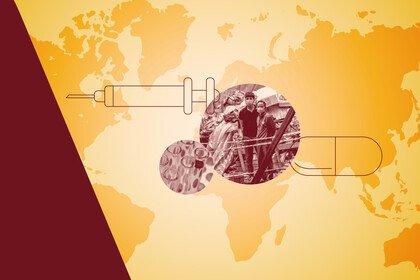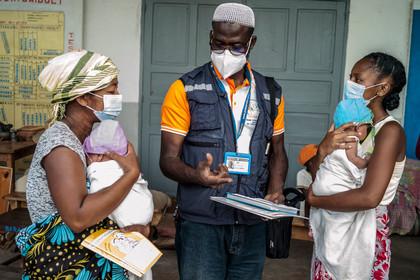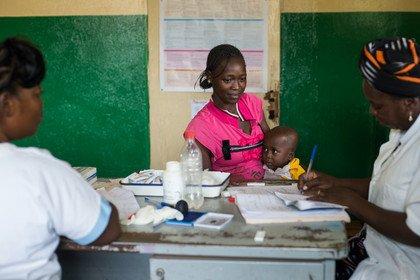
Five ways to scale up the African vaccine manufacturing industry
How can vaccine manufacturers in Africa expand their manufacturing capacity and capabilities? Deborah King, Vaccines Lead at Wellcome, highlights five key areas for support – including access to finance and training opportunities.

Andriy Onufriyenko via Getty Images
Africa is home to 1.4 billion people who require an estimated one billion vaccine doses for protection from vaccine-preventable diseases. Yet only 1% of those vaccines are produced on the continent.
The Covid-19 pandemic highlights the vulnerability of this position, with African countries waiting many months longer than countries in the Global North to receive vaccine doses. This demonstrates the need to improve vaccine equity and better prepare for future pandemics by increasing the local supply of vaccines in Africa.
In response to the inequity of vaccine distribution seen during the pandemic, there is strong political commitment in Africa to expand vaccine manufacturing capabilities across the continent. One goal – set out by the African Union and the African Centres for Disease Control and Prevention – is to manufacture 60% of Africa's vaccine needs locally by 2040. To deliver this ambitious target, the Partnerships for African Vaccine Manufacturing (PAVM) launched a Framework for Action (FFA) in March 2022, defining the programmes of work needed to develop a sustainable vaccine manufacturing industry.
Wellcome has worked with Biovac, a South Africa-based vaccine manufacturer, and Boston Consulting Group to produce a report capturing the perspectives of vaccine manufacturers in Africa on the challenges of scaling up and the areas where they most need support.
While the vaccine manufacturing industry in Africa is still developing, there are already established manufacturers on the continent, and many encouraging announcements have been made and initiatives launched in the last 18 months to support continental manufacturing targets.
Here, we look at five manufacturing success stories from around the world – and what can be learnt from them to support the growth of the African vaccine manufacturing industry.
1. Vaccine manufacturers don't have to rely on one financing solution
Despite having no prior vaccine manufacturing expertise, EuBiologics in Korea produced a safe, effective and affordable cholera vaccine prequalified by the World Health Organization in seven years.
When EuBiologics started this initiative in 2009, funding was the immediate challenge. No single donor was prepared to provide all the financing needed. However, EuBiologics secured the required $20 million investment from philanthropic, private and government sources. The investors also provided expertise and commercial partnerships to the endeavour, showing the value of the Public-Private Partnership model in establishing vaccine manufacturing capabilities. Using a funding pool in this way can help spread the financial risk for all involved donors and can result in rapid progress.
2. Joining forces helps to build knowledge and skills
The International Vaccine Institute (IVI) in Korea and Hilleman Laboratories in Singapore signed a three-year Memorandum of Understanding in October 2022, to collaborate on vaccine research and development (R&D). Their aim is to broaden the availability of safe, effective and affordable vaccines in low- and middle-income countries. This collaboration should see the two partners develop joint funding frameworks that will include activities on early vaccine development, manufacturing processes and clinical studies.
Such complementarity of strengths from two vaccine research organisations can facilitate the transfer of knowledge and skills, improving the success rate of R&D endeavours. This IVI/Hilleman partnership model could inspire African vaccine manufacturers to join forces with a global R&D partner.
3. Advance purchase agreements can enable long-term growth
Financial mechanisms are important for manufacturers, and tools such as advance purchase commitments can help secure financing from private investors, development finance institutions or national governments, as well as attract commercial partners.
One example of this is the ten-year commitment from the Brazilian government and BioManguinhos/Fiocruz to purchase vaccines from GSK. It enabled the global vaccine producer to sell its pneumococcal vaccine at a fixed price (about $11.50 per dose), while also giving Brazil access to the relevant technology and know-how for eventual domestic manufacturing (which lowered the cost per dose even more).
Advance purchase agreements, supported by governments, could help local African vaccine manufacturers attract partnerships with multinational corporations and access technology that can help them reduce dependence on external vaccine supply.
4. Technology transfers are critical to building manufacturing capabilities
Technology transfers – sharing the know-how, technologies and processes for vaccine manufacturing – are a priority support area identified by manufacturers in Africa.
Wellcome, working with the Bill and Melinda Gates Foundation, has recently supported a licensing and technology transfer agreement between IVI and Biovac, to manufacture an oral cholera vaccine. This work will expand Biovac's capabilities to manufacture drug substance, the raw material needed to manufacture vaccines.
Demand for cholera vaccines outstrips supply. And this demand is growing due to cholera outbreaks caused by climate change, armed conflict and displacements of people, coupled with a reduction in the number of manufacturers supplying this vaccine. Supporting manufacturers in Africa to produce a cholera vaccine offers an opportunity to build capacity in manufacturing while also improving supply in affected communities.
5. Training opportunities can upskill local talent
For vaccine manufacturers, attracting, retaining and upskilling talent is a top challenge. While technology transfers are an opportunity to build manufacturing capabilities beyond an individual product, the process can take years and can be highly complex. It's important that providers of technology transfers also train local people and emphasise capacity building in practice.
One way this can be achieved is through schemes that bring global experts in to work onsite with local manufacturers. Another is schemes for employees to gain practical experience through secondments with more established manufacturing sites across the globe.
One example is that of the Netherlands Vaccine Institute (NVI), which offered manufacturers in low- and middle- income countries the opportunity to gain practical and theoretical vaccine-manufacturing experience onsite in the Netherlands. The seconded employees could then take this practical experience back and apply it at factories in their home countries. One notable participant was Dr Cyrus Poonawalla, who had founded the Serum Institute of India (SII) a few years before joining the programme. The Institute went on to acquire the vaccine-producing division of NVI and set up Bilthoven Biologicals (BBio) in the Netherlands. Having a manufacturing base in Europe widened SII's access to global markets and today, SII is the world's largest vaccine manufacturer.
What's Wellcome doing to help?
At Wellcome, we want to ensure everyone, everywhere is protected from the threat of infectious diseases, which cause around a quarter of all deaths in the world.
To do that, we want to help strengthen vaccine regulation and manufacturing systems in Africa and around the world, so that all countries can act quickly in a disease outbreak.
We believe shifting investment towards prevention is key, so that the world can detect or prevent infections even before they start to escalate and spread.
We also want to create products that are affordable, accessible and available where they are needed so that the vaccines, tools and treatments we invest in can save the most lives.
We’re funding research to better understand what causes and drives infectious diseases to escalate and the solutions to control their impact. Explore our current funding call:
Infectious Disease Award: Understanding dengue and Zika spread, immunity and clinical outcomes


